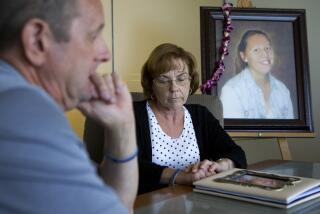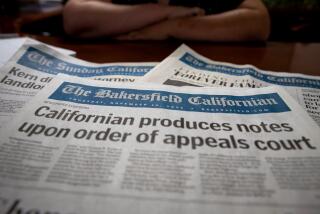5 key points debated in the decision to release Newtown 911 calls
Police in Newtown, Conn., on Wednesday will comply with a judge’s order to release audio records of 911 calls made last Dec. 14, as a gunman shot to death 20 first-graders and six school employees inside Sandy Hook Elementary School.
The state’s attorney for the Danbury region, Stephen Sedensky III, fought media requests for the recordings. Freedom-of-information advocates said the information should be made public.
Most of the victims’ families have said the calls should not be made public. But at least one, Cristina Hassinger, the daughter of slain Sandy Hook Principal Dawn Hochsprung, has supported the release. “I’d rather have more information about what happened that day,” she told the Connecticut Post. “The more information I have, the easier it is to wrap my brain around.”
WHO THEY WERE: Newtown shooting victims
Here are some of the arguments posed by each side:
1. The records should be released because it is the public’s right to know how police responded during the emergency.
“They are a clear record of government activity, and the public has the right to know what the government is doing to and for them,” said Kenneth Bunting, the executive director of the National Freedom of Information Coalition. “What better way to do learn this than to have the actual raw recording of someone’s call to a police agency?”
2. The records should be sealed because releasing them will add to the anguish of victims’ families and survivors of the massacre, and provide no useful information to the general public.
“If the tapes are released, I will never know when I may be confronted with the sound of myself or my colleagues calling for help,” said Shari Burton, a teaching assistant at Sandy Hook who was among those who dialed 911 that day. “There is nothing to be gained, no arrest to be made,” she said in written testimony to the state’s Task Force on Victim Privacy and the Public’s Right to Know. There is, Burton said, “just a lot more hurt and re-lived heartache.”
3. The records should be released to put to rest speculation, rumors and conspiracy theories that accompany unauthorized leaks of information.
“Every day, there is something in the media that drags us back to that terrible day,” Newtown’s highest elected official, First Selectman Pat Llodra, told the Danbury News Times last month, after she dropped her longstanding opposition to making the records public. “I think everything that can be released should be released,” said Llodra, who compared the slow leak of information to “water torture.”
Referring to conspiracy theorists who claim the shootings did not happen, the Hartford Courant said in an editorial last month: “Hiding information is feeding their craziness more than releasing the information would.”
4. The records should be sealed because, in the age of social media and computers, there is no way to prevent widescale distribution of and abuse of the files.
“While our Freedom of Information laws may have been adequate in a world where only the mainstream media disseminated information, that is simply no longer the case,” said Dean Pinto, whose 6-year-old son, Jack, died on Dec. 14. “Today, anyone with a computer can have a broader audience than your local newspaper, and decency and discretion seem to be unrecognizable concepts,” Pinto wrote to the Task Force on Victim Privacy. “We know that if … audio recordings of the events of December 14 are released to the public, they will be used to harass and further victimize the surviving children and teachers who witnessed their friends being killed, and the families of those who lost their lives.”
5. The records should be released, but only in written transcripts, to ensure audio files are not replayed by the media.
“911 transcripts can relay all the necessary information that the public wants without having to hear the sounds of a slaughter in the background,” said Bill Sherlach, whose wife, Mary Sherlach, was killed at Sandy Hook. Sherlach said releasing transcripts but not audio would balance the public’s right to know with consideration for families.
The Newtown Bee newspaper agreed.
“We acknowledge the right of the Associated Press and other news organizations to review the content of the calls as a means of examining the response by law enforcement to our most dire calls for help,” the Bee said in a recent editorial. “But transcripts and timelines should suffice. What purpose does it serve to record and disseminate the anguished cries of those reporting violent murders they have just witnessed, or even sounds of continuing gunfire? It serves morbid interests, not public interests.”
The court ruling: The records are to be released, because it’s the law.
Bridgeport Superior Court Judge Eliot Prescott ruled last month that Sedensky had no legal standing to keep the calls sealed under Connecticut’s Freedom of Information Act.
“Delaying the release of the audio recordings, particularly where the legal justification to keep them confidential is lacking, only serves to fuel speculation about and undermine confidence in our law enforcement officials,” the judge wrote.
Dan Klau, a Hartford attorney specializing in 1st Amendment cases, agreed and said he found it troubling that Sedensky was acting on behalf of Newtown and the Sandy Hook families. “He seems to have forgotten his job is to represent the state of Connecticut,” Klau told the Associated Press. “His conduct in many instances has seemed more akin to an attorney in private practice representing Sandy Hook families.”
ALSO:
Detroit ‘needs help,’ is eligible for bankruptcy, judge rules
Medical worker gets 39 years for infecting dozens with hepatitis
Would a proposal calling for taller buildings ruin the Washington, D.C., skyline?
More to Read
Start your day right
Sign up for Essential California for news, features and recommendations from the L.A. Times and beyond in your inbox six days a week.
You may occasionally receive promotional content from the Los Angeles Times.







